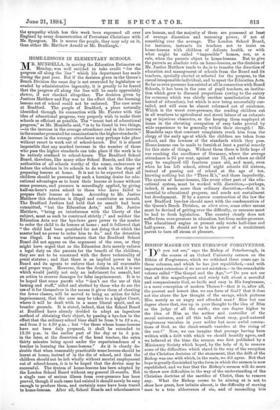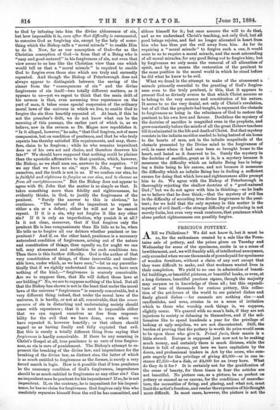BISHOP MAGEE ON THE ETHICS'OF FORGIVENESS. •
" DO you not see," says the Bishop of Peterborough, in the course of an Oxford University sermon on the Ethics of Forgiveness, which we criticised three years ago in these columns, and which he has just republished,—and with important extensions if we are not mistaken,—in the remarkable volume called " The Gospel and the Age,"—" Do you not see that all this magniloquent and windy talk about a merciful and compassionate God, so facile and easy in His forgiveness,' is a mere conception of modern TheismT—that it is, after all, the poorest and lowest idea we can form of God P that it does not rise above the low thought of the savage, which pictures Him merely as an angry and offended man P Rise but one degree above that, rise up in your thought to the idea of Him' as the judge of all the earth ; rise one degree higher to' the idea of Him as the author and controller of the moral universe, and all this talk about easy, good-natured forgiveness vanishes in your nobler but more awful concep- tions of God, as the cloud-wreath vanishes at the rising of the sun ?" Now, we can imagine that passage having been written with a drift with which we should heartily agree, and we believed at the time the sermon was first published by Missionary Society which hoped, by the help of it, to remove some of the difficulties which stand in the way of the reception of the Christian doctrine of the atonement, that the drift of the Bishop was one with which, in the main, we did agree. But that hope is greatly diminished by the form in which the sermon is now republished, and we fear that the Bishop's sermon will do more to throw new difficulties in the way of the understanding of the Christian doctrine of the sacrifice of Christ, than to remove any. What the Bishop seems to be aiming at is not to show how great, how infinite almost, is the difficulty of moving man to a true abhorrence of sin, and of reconciling him to God by infusing into him the divine abhorrence of sin, but how impossible it is, even after that difficulty is surmounted, to conceive God as forgiving sin, except by the help of some- thing which the Bishop calls a "moral miracle" to enable Him to do it. Now, far as our conception of God—far as the Christian conception of God—is from that of a Being who is "easy and good-natured" in his forgiveness of sin, not even that view seems to us less like the Christian view than one which would tell us that a " moral miracle " is required to enable God to forgive even those sins which are truly and earnestly repented. And though the Bishop of Peterborough does not always appear to distinguish between the saving of the sinner from the " consequences of sin " and the divine forgiveness of sin itself—two totally different matters, as it appears to us—yet we regret to think that the main drift of his sermon is that, even assuming true repentance on the part of man, it takes some special suspension of the ordinary moral laws of the universe in which we live, to enable God to forgive the sin thus heartily repented of. At least, if this be not the preacher's drift, we do not know what can be the meaning of this passage, the earlier part of which is, as we believe, new in the sermon as Dr. Magee now republishes it. "Is it alleged, however," he asks, "that God forgives, not of mere compassion, but on condition of penitence, and that he who truly repents has thereby satisfied His requirements, and may, there- fore, claim to be forgiven ; while he who remains impenitent does so of his own act and choice, and therefore deserves his fate P" We should have supposed that nothing could be plainer than the apostolic affirmative to that question, which, however, the Bishop, as we shall soon see, answers in the negative. "If we say that we have no sin," says St. John, "we deceive ourselves, and the truth is not in us. If we confess our sins, he is faithful and righteous to forgive us our sins, and to cleanse us from all unrighteousness." But the Bishop does not appear to agree with St. John that the matter is so simple as that. It takes something more than fidelity and righteousness, he evidently thinks, in God, to justify the forgiveness of the penitent. " Surely the answer to this is obvious," he continues. "The refusal of the impenitent to repent is either a sin or a defect ; either he will not or he cannot repent. If it is a sin, why not forgive it like any other sin ? If it is only an imperfection, why punish it at all ? Is it not clear, moreover, that if God forgives only the penitent He is less compassionate than He bids as to be, when He tells us to forgive all our debtors whether penitent or im- penitent P And if, on the other hand, penitence is a necessary antecedent condition of forgiveness, arising out of the nature and constitution of things, then equally so, for aught we can tell, may atonement and mediation be such conditions too. Then there is this further difficulty. God is the author of that very constitution of things, of those inexorable and unalter- able laws, under which, as we have seen,"—let us say parenthe- tically that if we rightly understand the sermon, we have seen nothing of the kind,—" forgiveness is scarcely conceivable. Are we to suppose then, that He will deflect those laws at our bidding ?" No, we are to suppose nothing of the kind. But all that the Bishop has shown is not in the least that under the moral laws of the universe " forgiveness " is scarcely conceivable, but a very different thing indeed, that under the moral laws of the universe, it is hardly, or not at all, conceivable, that the conse- quences of sin in disturbing and undermining society should cease with repentance ; that it is next to impossible either that we can regard ourselves as free from responsi- bility for the evil that we have done, even when we have repented it, however heartily ; or that others should regard us as having finally and fully expiated that evil. But this is surely a totally different thing from saying that forgiveness is hardly conceivable. If there be any meaning in Christ's Gospel at all, true penitence is as sure of true forgive- ness, as sin is sure of punishment. The Bishop's attempt to re- present the breaking of the divine law, and impenitence for the breaking of the divine law, as distinct sins, the latter of which is as much entitled to forgiveness as the former, is surely a very forced march in logic. How is it possible that if true penitence be the necessary condition of God's forgiveness, impenitence should be as much entitled to forgiveness as any other sin ? Can an impenitent man be penitent for his impenitence P If so, he is not impenitent. If, on the contrary, he is impenitent for his impeni- tence, he has no claim for forgiveness. God forgives only him who resolutely separates himself from the evil he has committed, and abhors himself for it ; but once assume the will to do that, and as we understand Christ's teaching, not only God, but all good beings rejoice, and feel no longer alienated in heart from him who has thus put the evil away from him. As for its requiring a " moral miracle" to forgive such a one, it would seem to us to require a moral miracle, and the most astounding of all moral miracles, for any good Being not to forgive him; but by forgiveness we only mean the removal of all alienation of spirit, and by no means the restoration of the penitent to the same position in the moral world in which he stood before he did what he knew to be evil.
What we dread in the attempt to make of the atonement a miracle primarily essential to the granting of God's forgive- ness even to the truly penitent, is this, that it appears to present God as divinely averse to that which Christ assures us to belong to the very essence and constitution of his nature. It seems to us the very denial, not only of Christ's revelation, but of all that the prophets had taught, to represent the obstacle to forgiveness as being in the reluctance of God to restore the penitent to his own love and favour. Doubtless the mystery of the doctrine of sacrifice is magnified even in the prophets, and grew constautlybefore the minds of all the great Hebrew teachers till it culminated in the life and death of Christ. But that mystery consists in the infinite sacrifice needed to bring hatred of sin home to the hearts of men, not in the infinite magnitude of the obstacle presented by the Divine mind to the forgiveness of evil, in cases where it had once been so brought home to the heart, and hated as it deserved to be. Surely the mystery in the doctrine of sacrifice, great as it is, is a mystery because it measures the difficulty which an infinite Being has in bring- ing a finite being to his senses, and not because it measures the difficulty which an infinite Being has in finding a sufficient excuse for doing that which love and righteousness alike prompt him to do. We agree with the Bishop of Peterborough in thoroughly rejecting the shallow doctrine of a "good-natured God ;" but we do not agree with him in thinking,—as he leads us to believe that he does think,—that the mystery of evil lies in the difficulty of according true divine forgiveness to the peni- tent; for we hold that the only mystery in this matter is the mystery of evil itself,—the strange difficulty of producing in not merely finite, but even very weak creatures, that penitence which alone perfect righteousness can possibly forgive.



































 Previous page
Previous page